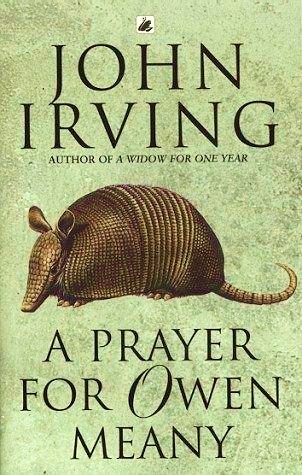 Written by Lauryn Smith My interest in John Irving’s writing began after I read his award-winning “The World According to Garp” in high school. I promise to give a review of “Garp” as soon as I replace my lost copy, which met its fate in a puddle of water. (Trust me, though, you must read it!) For now, let’s talk about “A Prayer for Owen Meany,” Irving’s all-time best-selling novel. The fictional story is deep, poignant, complexly germane and truly captivating. The titular character, Owen, is an intelligent, small-statured, shrill-voiced, 11-year-old son of a quarryman. He grows up in Gravesend, New Hampshire, with his best buddy John Wheelwright, whose family comes from old money. John narrates the twists and turns of their relationship, from the Little League baseball game during which Owen’s foul ball kills John’s mother to Owen’s death, a divinely crafted occurrence that Owen adamantly believes he has foreseen. This novel is one of predestined heroism and a boy determined to curate his life experiences in preparation for his final act. (The vagueness concerning Owen’s fate is necessary—spoilers! I can say, however, that in his role as the Ghost of Christmas Future for a production of “A Christmas Carol,” he inexplicably sees his name and date of death on Scrooge’s gravestone, which fortifies his ideas about his purpose and his link with God.) The majority of the story takes place throughout the 1950s and 1960s, so readers get to follow Owen and John as they transition from days composed of TV viewing and rounds of armadillo hide-and-seek (read the book to see what I mean – it is a whole thing) to days composed of collegiate activities and wartime rhetoric. Several themes are unmissable. Perhaps the most notable motif that Irving explores if that of friendship. (Example “aww” moments include 1) the trustful sharing of treasured baseball cards between Owen and John and 2) Owen’s voluntarily repeating grade nine when he learns that John was held back, all so that they might attend Gravesend Academy together.) Also prominent are the concepts of religion and faith as well as the corresponding concept of doubt. In addition, Irving cleverly integrates insights into the stateside turmoil associated with the Vietnam War. Though these topics hold the story together, they are arguably tangential to a larger theme, that is, the loss of one’s childhood and the beautiful tragedy of maturing. Given its position in the book, many have questioned Irving’s perspective on the Vietnam War. He was not a participant due to the timing of his having his first child, but he says that he would have gone, not in support of the war or even for reasons of patriotism, but to satisfy his creative wonderings. The same goes for his perspective on religion. Irving almost considers himself part-time religious, occasionally going to church, praying during turbulent times. But he says that he has had no miraculous religious experience to speak of. It appears as though Irving uses “A Prayer for Owen Meany” as a study of minute or overlooked facets of both the war and religion. Irving is a prolific writer, and his style is balanced, unique and wholly accessible, artfully pure and poetic. Irving is duly aware of this. He has said that he pays special attention to the opening and closing lines of his novels. He has even said that he believes his opening sentence for “A Prayer for Owen Meany” is his best one and that it probably always will be. He might be right. Read it and be amazed, seriously: I am doomed to remember a boy with a wrecked voice—not because of his voice, or because he was the smallest person I ever knew, or even because he was the instrument of my mother’s death, but because he is the reason I believe in God; I am a Christian because of Owen Meany That sentence alone is testament to Irving’s talent. The world he builds in “A Prayer for Owen Meany” is easy to jump into, and the characters he develops become familiar almost instantly. He misses no key detail. Irving even brings new life to “A Christmas Carol,” the traditional, oft rehearsed Christmastime play. (I can say from experience that watching this play live after having read “A Prayer for Owen Meany” is a significantly chilling experience.)
In a way, Irving mirrors the acts composing the premise of the story, himself acting as a diviner. He crafts an eloquently dramatic fate for Owen, then designs for him a life that facilitates this fate. He invites readers to partake in an otherworldly magic, drawing them into the domain of a character who is at once both comedic and heartbreaking, and ultimately heroic. Come the conclusion, literally everything comes full circle, giving readers a sense of purpose, a sense that everything happens for a reason. Readers will absolutely walk away having learned something pertaining to the key themes, whether a directly factual point or one that is more nuanced. (I, for instance, gained a better sense of the significance of the Vietnam Draft and the extent to which it was sometimes avoided.) That said, to read this book, there is no need to be a Christian, no need to be pro- or anti-Vietnam War, no need for any such thing—it is universally enjoyable, so long as you are willing to take the time to appreciate it. Side note time. A movie called “Simon Birch” is very loosely based on this book. While the general concepts are similar, the entire second half of the movie deviates from the book. (The name change of the titular character is supposedly to prevent viewers who have also read the book from being misled, as there are such drastic deviations). There is so much depth to “A Prayer for Owen Meany” that it is impossible to do it justice in a short review. Some have argued that the book is too multilayered or too involved. It is admittedly a long read, but it is absolutely a good read. The foundation may be a bit incredible, but maybe that is the point. Read it once, then read it again. I know I will, even if just to make the acquaintance of these characters again. Title: A Prayer for Owen Meany Author: John Irving Publisher: Black Swan Original publication date: March 1989 Page count: 637 List price: $17.99 ISBN: 978-0552135399
1 Comment
|

Enjoying my book reviews? If you’ve found them helpful or simply love diving into a good book, consider supporting my caffeine-fueled reading sessions! Your contribution helps keep the reviews coming and ensures I stay wide awake for those late-night reading marathons. Cheers to a shared love for literature! ☕️
Categories
All
|
